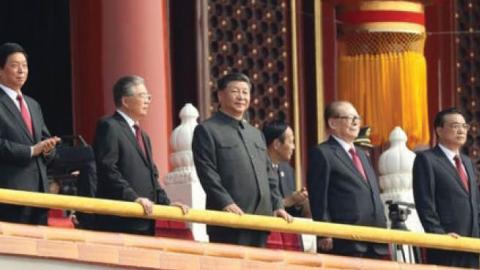The acceleration of U.S.-China rivalry is failing to produce an intelligent consensus over an effective response. Extreme voices drown out sensible views that reflect America’s better angels. Too many accomplished people engage in loud, petty and polarized debate when they should be working together to renew American leadership at home and abroad.
To inform wise statecraft, the United States must clearly define its relationship with China. What do we stand for, what can we live with, what can we not abide, and who is with us? Reflecting on these questions might render more thoughtful policies than those bandied about in our imbalanced deliberation, which can lurch from demanding absolutist confrontation to spineless acquiescence.
At one end of the spectrum, we search for a latter-day Mr. X to lay out a cold war containment strategy to topple the Chinese Communist Party (CCP). That blueprint usually begins with an immaculate decoupling of the world’s two largest economies, often includes ending the decades-old “ One China” policy by recognizing Taiwan’s independence, and ends with a dangerous bipolar contest. While a shift in the fortunes of two major nuclear powers need not lead to war — aka the Thucydides trap — the strategy requires more precision about ends and means.
At the other end of the China debate, growing trade and cooperation magically produce a happy outcome. Some willfully ignore the imposition of surveillance-state oppression at home, the de facto annexation of the South China Sea and China’s creation of a regional sphere of influence, and the replacement of the post-World War II order with a Sino-centric ruleset. For some, buying into Beijing's narrative and accepting CCP misbehavior is preferable to competing.
Grand strategy and world order require less dogmatic ideology and more agility. In the memorable metaphors revived by Oxford don Isaiah Berlin, we need to be both the hedgehog and the fox. The hedgehog knows one big thing and tenaciously pursues a single vision, and the fox knows many things and craftily chases competing priorities.
America needs hedgehogs to tackle challenges such as creating a workable China policy. More acutely, however, we need foxes who can navigate among contradictory and unrelated major issues to advance both the national interest and the greater good.
Any China strategy that fails to address the CCP’s coercive policies, or fails to enumerate a “theory of victory” short of war or surrender, is hardly a design for a brighter future.
Smart China policy is a prerequisite for America in the 21st century. But rather than coalescing around a sensible middle theory, partisan politics are squeezing out moderate views. One either must be ready to escalate a currently bounded competition with China into an all-out war or face being branded a traitor, or one must appease an exploitative CCP by letting it pick our pockets in our open system.
In a recent Wall Street Journal essay, Elbridge Colby and Wess Mitchell define a more robust approach to thwarting China’s bid for hegemony. The pair of former Trump administration officials call for reducing the vulnerability of our supply lines and critical technologies to Chinese predations, while expanding free trade with like-minded partners. They also plea for “a credible forward defense” to “blunt any Chinese aggression.”
But they stop short of articulating a necessary component for alliance buy-in — namely, a compelling plan for sustaining the People’s Republic of China economic and diplomatic engagement while managing risks. We could learn from pragmatic allies who have had to navigate these challenges from within China’s neighborhood. We might begin with the advice of Australian John Garnaut, who recommends a shared “framework of principles that can secure a broad and durable consensus, within countries and between them.”
Garnaut’s warning implies that the United States, in concert with allies, should pass legislation and build institutions to contain China’s — or any country’s — interference and subversion. Equally, we must demonstrate a coherent concept for preserving a free and open flow of commerce, an idea that has been at the core of America's regional engagement in Asia for more than 200 years.
Devising a workable China policy is tricky and should not be free from contentious debate. But strong American leadership demands a coherent, constructive strategy for managing a relationship with a country holding one-fifth of humanity and tomorrow’s largest economy. Absent a wiser approach, calls for sanctions, recognizing Taiwan, or curbing all contacts with China are mere tactics.
Read in The Hill


















